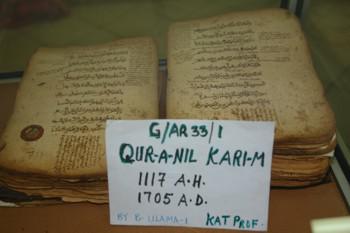Putting Archives on Trial: A Note on Lawyers in Search of Records
Samaila Suleiman
The struggle over the production, management and consumption of historical knowledge is not confined to history departments and history books. They are also embedded in concrete institutions of history such as archives and museums where evidence is created, codified, stored and imbued with “legitimacy” and “authority”. Who are the most regular consumers of archival records? My initial idea of archives, as a primary sanctuary of historians, was jolted when I ventured into studying archives as a cultural institution and epistemological organisation, rather than a simple database of docile and dusty files waiting to be excavated by expert historians. This led to my discovery of an interesting circuit of archival consumption at the National Archives Kaduna (NAK), located in the northern Nigerian city of Kaduna. I found that the preponderance of users of the Kaduna archives were legal practitioners.
NAK, established in 1957, was formally commissioned in 1963 and some 51,000 files of the Northern Region’s Secretariat were transferred there. Like the two other regional offices in Ibadan and Enugu, NAK became responsible for the records of all the Northern provinces—Adamawa, Bauchi, Benue, Borno, Ilorin, Kabba, Kano, Katsina, Niger, Plateau, Sokoto, and Zaria. The collections at NAK are related to the administrative development of Northern Nigeria from the inception of Colonial Government in 1900 to 1959. It houses records of the Secretariat of the Northern Provinces (SNP) 1900-1959, files of the Office of the Premier of the Northern Region 1956-1966, and records of the defunct ministries and agencies of the then Northern Regional Government. It is also in custody of some of the oldest Arabic manuscripts in northern Nigeria. These records deal with the activities of Muslim traders, Muslim missionaries and adventurers. Other records available include old and current newspapers.

With the upsurge of conflicts relating to land, chieftaincy and boundary matters, particularly in areas of the so-called Middle Belt region such as Jos and Southern Kaduna, the NAK became a research hotbed for lawyers and ethnic associations. A close examination of the users’ register of the archives between 1994 and 2010 reveals that the majority of the users are legal practitioners. Over this period, more than 50 lawyers visited the archives in search of records on chieftaincy, land and boundary issues in Jos, Makurdi and Southern Kaduna.
There is, thus, a dramatic shift in the status of colonial files—dealing with land and chieftaincy matters—from conventional sources of colonial history to plausible evidence in court cases. The National Archives Acts of Nigeria stipulates that a copy of or extract from any record or archives in the National Archives, including microfilms and photocopies of such a copy or extract purporting to be duly certified as true and authentic by the director or by the custodian of the public archives in any place of deposit where such record is kept, and authenticated having impressed thereon the official seal of the council or of the place of deposit, shall be admissible in evidence if the original would have been admissible in evidence in any proceedings. Yet, what happens when lawyers enter the sphere of archives?
Let us look at one instance of litigation over a royal palace in a Southern Kaduna community to illustrate the engagement of lawyers with archives. The case involves a dispute over the ownership of the present palace of the Kagoro Chiefdom in Kaura Local Government, Kaduna State. The plaintiffs claim that since the creation of the Kagoro Chiefdom, there has been no official, permanent royal palace and that every successive chief had to convert part of his personal residence into a palace. On the other hand, the defendants assert that the palace is a public institution. Following several futile searches for relevant documents at the local Government council, the plaintiffs resorted to NAK in search of a file, which—as they were informed—shows decisively that the palace had been taken over by the government from the defendants. Therefore, the lawyer for the defendants went to the archives in search of the said document. He arrived at NAK on 26 October 2013 and consulted 15 colonial files on Jema’a District from the 1920s and the 1950s. He found a useful file containing minutes of correspondences between Gwamna Awan and the British Colonial District Officers in charge of the Kagoro District of Zaria Province. These files deal with matters relating to financial estimates of certain public works carried out in Kagoro Chiefdom. According to the lawyer, the records in those files show evidence of reimbursement in which the former Chief of Kagoro and the progenitor of the plaintiffs, Gwamna Awan, requested reimbursement for the cost of building the palace, which was approved by the Resident Officer. He was intrigued! For him, it was actually intriguing to discover documents of the correspondences between the former Chief of Kagoro and the Colonial District Officer, showing specific evidence of government’s stake in the ownership of the palace. In the words of the lawyer: “such discovery strengthens the defence case. The whole file was important and if I tender such a document in court they will see the sequence of how everything happened.”
Lawyers deploy archival arguments as a legal instrument. They search for corroborative evidence that would support the case of their clients—brushing aside any possible counter-evidence. And since they are paid to defend their client, the tendency is to hide contrary evidence from the opponents. Although legal practitioners, like professional historians, are taught to be fair and honest within the canons of legal discipline, in practice they try as much as possible to maximise the chances of their clients in the court of law.